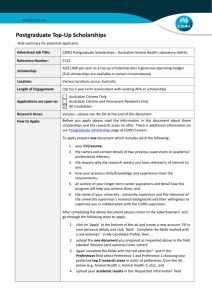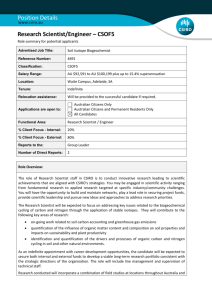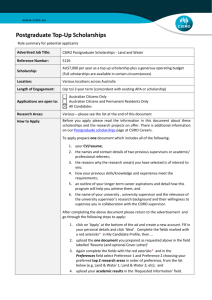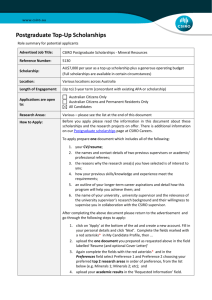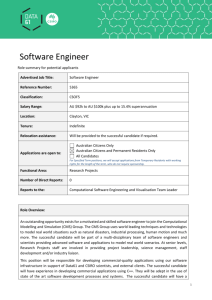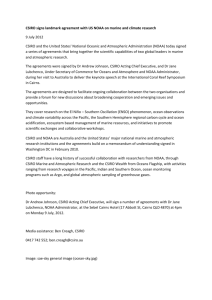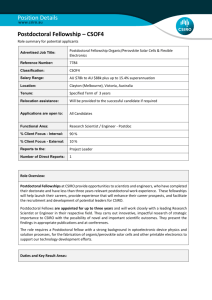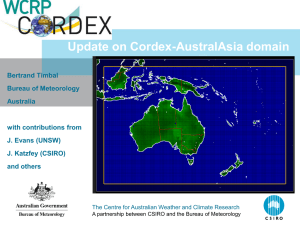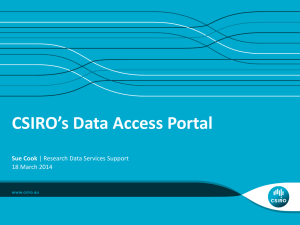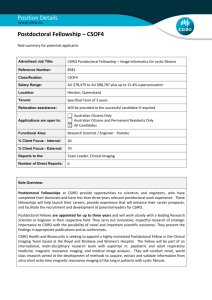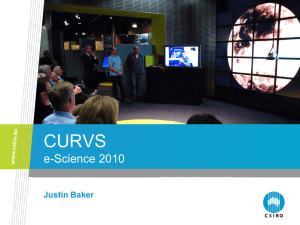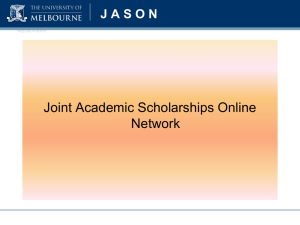Postgraduate Top-Up Scholarships
advertisement
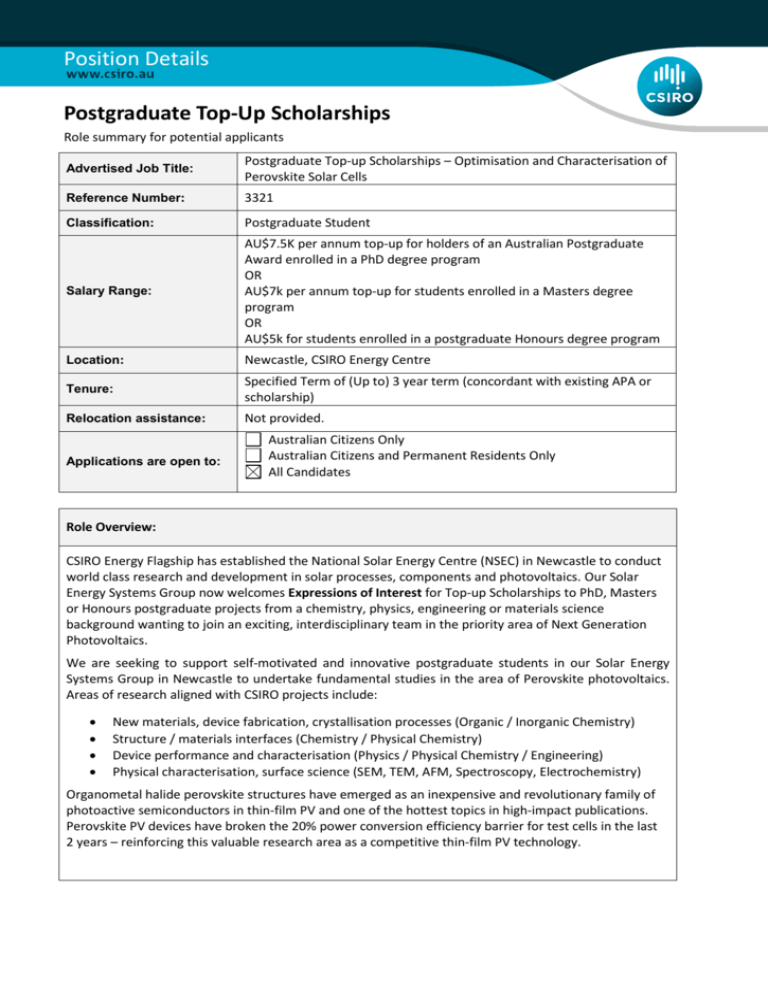
Position Details Postgraduate Top-Up Scholarships Role summary for potential applicants Advertised Job Title: Postgraduate Top-up Scholarships – Optimisation and Characterisation of Perovskite Solar Cells Reference Number: 3321 Classification: Postgraduate Student Salary Range: AU$7.5K per annum top-up for holders of an Australian Postgraduate Award enrolled in a PhD degree program OR AU$7k per annum top-up for students enrolled in a Masters degree program OR AU$5k for students enrolled in a postgraduate Honours degree program Location: Newcastle, CSIRO Energy Centre Tenure: Specified Term of (Up to) 3 year term (concordant with existing APA or scholarship) Relocation assistance: Not provided. Applications are open to: Australian Citizens Only Australian Citizens and Permanent Residents Only All Candidates Role Overview: CSIRO Energy Flagship has established the National Solar Energy Centre (NSEC) in Newcastle to conduct world class research and development in solar processes, components and photovoltaics. Our Solar Energy Systems Group now welcomes Expressions of Interest for Top-up Scholarships to PhD, Masters or Honours postgraduate projects from a chemistry, physics, engineering or materials science background wanting to join an exciting, interdisciplinary team in the priority area of Next Generation Photovoltaics. We are seeking to support self-motivated and innovative postgraduate students in our Solar Energy Systems Group in Newcastle to undertake fundamental studies in the area of Perovskite photovoltaics. Areas of research aligned with CSIRO projects include: New materials, device fabrication, crystallisation processes (Organic / Inorganic Chemistry) Structure / materials interfaces (Chemistry / Physical Chemistry) Device performance and characterisation (Physics / Physical Chemistry / Engineering) Physical characterisation, surface science (SEM, TEM, AFM, Spectroscopy, Electrochemistry) Organometal halide perovskite structures have emerged as an inexpensive and revolutionary family of photoactive semiconductors in thin-film PV and one of the hottest topics in high-impact publications. Perovskite PV devices have broken the 20% power conversion efficiency barrier for test cells in the last 2 years – reinforcing this valuable research area as a competitive thin-film PV technology. Duties and Key Result Areas: Priority Research Area Description: This position could be filled by a student from a range of backgrounds, including chemistry, physics, engineering or materials science. Of particular interest would be a student with strong physical chemistry, electrochemistry or spectroscopy/surface science skills. Although the chemistry of these new semiconductors is simple and is well understood, the morphological structure that arises during fabrication leads to significant variability in measured devices An immediate challenge is understanding and control of crystalline growth and how this impacts photophysical properties of the device. Perovskite devices can be fabricated using numerous architectures (planar, mesostructured, inverted) processed from solution, evaporation, sublimation, spin-cast etc. Variability between devices (<500nm thick) is not evident in bulk characterisation techniques (SEM, XRD etc.) where intimate material interfaces in the multi-layered device structure result in complex resistances that manifest as losses in voltage, current and ultimately efficiency. The successful candidate will work jointly with Dr Greg Wilson (email: Greg.Wilson@csiro.au) and Dr Tim Jones at the CSIRO Energy Centre in Newcastle, in addition to his/her university supervisor. Students from Australian or International institutions should contact Dr Wilson to discuss arrangements. Scholarship Information: Top up scholarships are available to PhD students who have gained (or expect to gain) an Australian Postgraduate Award (APA) or equivalent scholarship at an Australian university. While the normal expectation is that scholarships will be full time, they may be converted from full time to part time where CSIRO agrees that there are compelling reasons for this and the APA, if any, is also converted to part time. At the time of submitting an application for an PhD Scholarship top-up, students must also expect to receive an Australian Postgraduate Award (APA) or university equivalent commencing in that year. Joint supervision of students by a university and a CSIRO supervisor is required wherever possible, and such joint supervisory arrangements must be consistent with the Higher Degree by Research Regulations of the host university. It is expected in most cases the primary supervisor will be the university supervisor. Recipients of CSIRO Postgraduate Studentships and Supplementary Awards are generally required to be Australian citizens or have permanent residency status. However, in fields in which there is a national skill shortage, studentships may be awarded to overseas candidates provided they are prepared to seek permanent residency as soon as possible within Department of Immigration and Citizenship policy guidelines. International students must be able to show evidence of admission to an Australian university, as well as evidence that either their living costs or international student tuition fees are being covered by another scholarship or from private funds. Top-up scholarships are being offered in a number of output research areas and it is expected that a significant component of research will be undertaken at CSIRO in Newcastle except where it is demonstrated the facilities necessary are only available at the host university. Selection Criteria: Under CSIRO policy only those who meet all essential criteria can be appointed. Applicants must address the core selection criteria (project details, academic calibre and research prospects) in your resume. Evidence of academic results is also required. The four criteria on which the applications will be assessed are: 1. Quality and relevance of student project The primary assessment criterion for top-up scholarships is the quality and relevance of the project being proposed. The research must be complementary to, and clearly aligned with, the advertised priority research area. 2. Academic calibre of the student The quality of the student is also critical to the assessment of a scholarship and candidates must hold (or expect to gain) a relevant degree from a recognised University. 3. Availability of appropriate university supervision The relevance of the University supervisor’s research background and their willingness to supervise the student in partnership with the CSIRO supervisor should also be made clear. 4. Potential to support directions of the research area The potential of the proposed student project to support the directions of the advertised research priority area is essential. Pre-Requisite The student must hold (or expect to gain) an Australian Postgraduate Scholarship or equivalent and be accepted as a PhD/Masters/Honours student at an Australian University. The student must not be in full time employment, and must not be subject to an obligation to a third party to provide that party with rights to any IP created in the course of their degree. CSIRO is a values based organisation. You will need to demonstrate behaviours aligned to our values of: Integrity of Excellent Science Trust & Respect Creative Spirit Delivering on Commitments Health, Safety & Sustainability Other special requirements: Appointment to this role may be subject to conditions including security/medical/character clearance requirements. Applicants who are not Australian Citizens or Permanent Residents may be required to undergo additional security clearance processes; which may include medical examinations and an international standardised test of English language proficiency (i.e. IELTS test).http://www.ielts.org/default.aspx Other Information: How to Apply Please apply for this position online at www.csiro.au/careers. You may be asked to provide additional information (online) relevant to the selection criteria. If so, then responding will enhance your application so please take the time to provide relevant succinct answers. If you experience difficulties applying online call 1300 301 509 and someone will be able to assist you. Outside business hours please email: csiro-careers@csiro.au. Referees: If you do not already have the names and contact details of two previous supervisors or academic/ professional referees included in your resume/CV please add these before uploading your CV. Contact: If after reading the selection documentation you require further information please contact: Dr Greg Wilson via email at greg.wilson@csiro.au or phone: +61 2 4960 6017. Please do not email your application directly to Dr Wilson. Applications received via this method will not be considered. About CSIRO: Australia is founding its future on science and innovation. Its national science agency, the Commonwealth Scientific and Industrial Research Organisation (CSIRO) is a powerhouse of ideas, technologies and skills for building prosperity, growth, health and sustainability. It serves governments, industries, business and communities across the nation. Find out more! www.csiro.au. About CSIRO Energy Flagship We are pioneering low-emission technologies that create value for industry and households and provide the knowledge which will help guide Australia towards a smart, secure energy future. For further information on the CSIRO Energy Flagship please visit http://www.csiro.au/en/EF Through our scientists and research facilities, CSIRO Energy Flagship is playing an essential role in achieving reduced emissions and the better use of energy resources. Our solar project priorities focus on research at the National Solar Energy Centre and examine the technical, economic, environmental and transitional issues for uptake of new energy technologies. See more: www.csiro.au/energy The Solar Energy Systems Group represents CSIRO’s core capability in solar thermal and photovoltaic technologies for power generation and energy storage. Our photovoltaic research activities covers the entire technology chain including new materials discovery, device fabrication and optimisation, materials characterisation and cell performance determination, energy yield and device durability.
